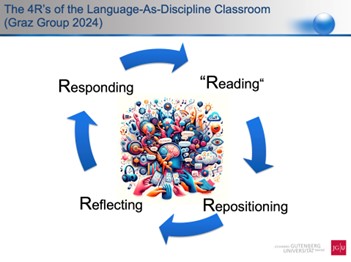The 4Rs of the language-as-discipline classroom
In the language-as-discipline classroom, deeper learning becomes a reality when teachers and learners engage in learning partnerships to conceptualise, communicate, and connect with each other in profound ways to understand and argue global issues, translating their insights into local actions that address these imperatives (Graz Group 24).

Pluriliteracies for Global Citizenship focuses on a core methodology known as the '4Rs': Reading, Repositioning, Reflecting, and Responding. This pedagogical approach is designed to engage students with complex and controversial global issues through a multi-faceted lens:

Critical “Reading” serves as the foundation, where students explore a wide range of plurimodal texts and text types (from TikTok-videos to NYTimes-articles) that introduce them to diverse narratives and perspectives.
Repositioning builds on this by contrasting these texts with others that may present conflicting viewpoints, enriching students’ understanding of the subject matter from multiple points of view/angles. This will help learners understand how language is used to shape discourses and how it impacts audiences. This is vital for learners to develop critical literacy skills that will protect them from misinformation and manipulation.
Reflecting is the third phase, where students analyse and evaluate what they have learned, examining their own positions and biases. In this stage, a new culture of arguing for deeper understanding is fostered, where learners explore workable solutions and common ground, which is central to enriching dialogue and broadening perspectives. This stage is crucial for cultivating empathic understanding and compassion, defined as the ability to deeply comprehend and emotionally connect with someone else's experiences and problems.
The final R, Responding, transitions students from global awareness to local action. This stage emphasizes the practical application of their insights, enabling students to see the relevance of global issues in their own lives and communities. By encouraging actions such as counter-texting or community involvement, students are empowered to make a tangible impact, bridging the gap between understanding and action.
Through the 4Rs, we aim to develop critical literacies, cultural consciousness, textual and epistemic fluency. This will not only foster empathy and compassion but also equip students with the skills necessary to contribute positively to their own well-being, their communities and the wider world. This approach ensures that they become proactive participants in their societies, ready to address challenges with both empathy and informed action, thus strengthening the democratic fabric of diverse global societies.